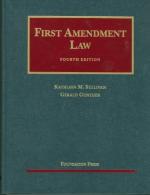|
This section contains 1,126 words (approx. 4 pages at 300 words per page) |

|
Redefining the First Amendment
Summary: Libraries should put filters on public computers because observing pornographic material is offensive to most people and may be intrusive to their privacy. The people that want to access the offensive material should do so in the privacy of their own home.
Libraries provide patrons with many different sources of information including books, magazines, newspapers, videos, films, audio tapes, and many other types of informative tools that help us get through our everyday lives a little easier. Librarians regulate all of the sources of information in a library. If a piece of material may seem offensive to someone, the librarian will not put the offensive material on library shelves for the public to read. The same concept should hold true for information on the internet. In the last ten years, libraries have incorporated the internet in their cornucopia of information available to patrons. There is an infinite amount of information on the World Wide Web for the public to access that the library might not have in a book. The internet also saves hours of research because people can access amounts of information at lightning fast speeds. Most of the...
|
This section contains 1,126 words (approx. 4 pages at 300 words per page) |

|


